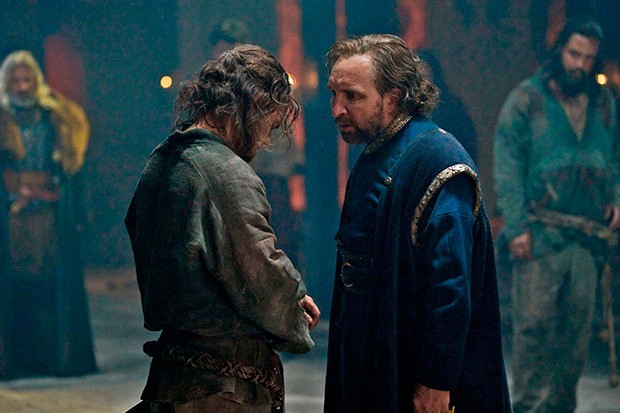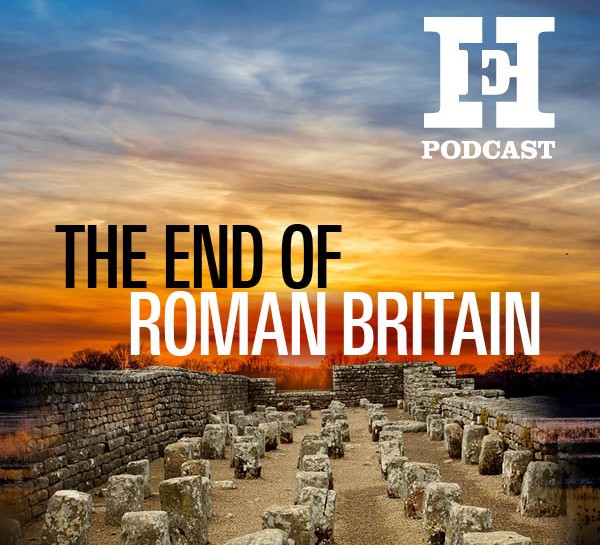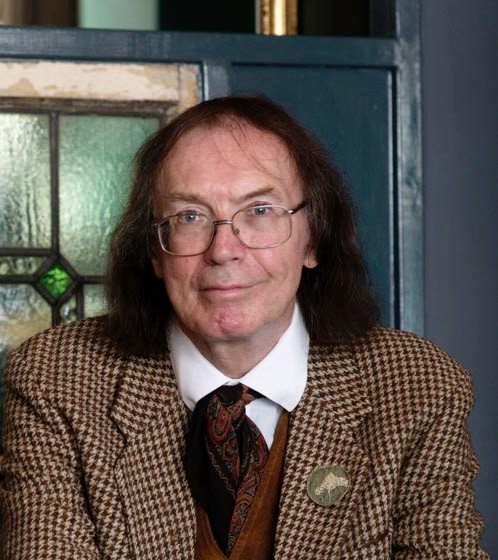How The Winter King brings Arthurian Britain to life
How do you approach the role of historical advisor on a TV series set in Arthurian Britain, when evidence of what happened is somewhere between scarce and non-existent? Professor Ronald Hutton tells us about his work on the new ITVX Arthurian drama The Winter King – and about life and death in fifth-century England

The car park adjacent to The Mall Cribbs Causeway shopping centre in north Bristol is not a location you would immediately associate with Arthurian Britain.
On the day of our visit, it is grey and drab. However, behind the walls of a nearby warehouse lies the unexpected: a recreated world of Arthurian Britain – constructed for The Winter King. This series is a new adaptation of The Warlord Chronicles trilogy, novels written by Bernard Cornwell of The Last Kingdom fame, which are themselves an adaptation of the story of King Arthur.
Here, in a space you might expect to see forklift trucks or light manufacturing, and which is noticeably colder than the mizzling day outside, the production crew have been busy building ‘rock’ walls from polyurethane, as well as cave interiors and vast menhirs. It’s fantastical and incongruous, but then who can say with any confidence what’s authentically Arthurian?
After all, according to the show’s historical advisor, Professor Ronald Hutton of Bristol University, interviewed in the significantly warmer environs of his office, we know little about the years between the Romans leaving Britain, in AD 410, and St Augustine arriving, in AD 597.
“It is a major event and the records don’t start to go darker and darker – the plug is pulled,” he says of the early fifth century after Rome’s legions withdrew.
“Instantaneously, the lights go out and it changes Britain completely. You have Saxons and post-Roman Britons roaming around this post-nuclear landscape of gigantic ruins. Technology crashes, people actually lose the art of making pottery for a while.”
To understand why there was such turmoil, it helps to consider the Romano-British economy.
Cash arriving to pay the army created “an immensely rich society”, Hutton says. This in turn attracted settlers from elsewhere in the empire, who built houses, and farmed and consolidated estates. When the Romans withdrew because the empire faced multiple attacks from barbarian tribes, the economy imploded.
“There’s no modern comparison, mercifully,” says Hutton when HistoryExtra offers the idea of a precursor to a modern-day failed state – although he’s amused by the analogy of a zombie apocalypse, with “the invading Anglo-Saxons standing in for the zombies, maybe, and the Irish and people from the north, Picts and Scots”.
All of which begs a question, what precisely is the role of a historical advisor if there’s so little actual history to advise on?
Consistency, says Hutton, is key. Not only is it the advisor’s job to help head off any “obvious anachronisms” but also to ensure that characters are “operating with a common set of cultural references”.
The alternative, even when viewers can’t quite put a finger on exactly what’s wrong, can be jarring. “What you don’t want to do is to have somebody using a 14th-century sword, a fifth-century ornamentation and speaking a 19th-century script,” says Hutton.
The end of Roman Britain
Member exclusive| What really happened in Britain as Roman influence waned? David Musgrove investigates what we know about the end of imperial rule in fifth-century Britain in this HistoryExtra podcast miniseries.

Who is the Winter King?
These kinds of anachronisms often bedevil period adaptations. The problem is particularly acute in Arthurian tales where the King Arthur – or the ‘King That Never Was’ as The Winter King’s promotional material has it – is a mishmash based on different stories.
The earliest of these dates from around 300 years after Arthur might have been around, and reach down the years to the present day via, among others, Geoffrey of Monmouth, Thomas Malory, the Romantic poets and TH White.
It hardly helps matters here that we don’t know if Arthur ever lived. “There’s a spectrum of possibilities, from a great national leader of the British resistance to non-existent,” says Hutton.
In this context, it’s fascinating to see how Bernard Cornwell’s novels made Arthurian Britain so believable, and avoided being hemmed in by competing stories.
“He was suggesting something that might actually have happened [in The Warlord Chronicles],” says Hutton, “but taking back people with later medieval names into that earlier period. That’s entirely legitimate. This is, after all, a work of fiction.” In Hutton’s estimation, Cornwell is “a superb storyteller”.
Cornwell’s source material thus offers the creators of The Winter King TV series a solid base from which to create a believable world. But what about the real era? Why would anyone want to come to Britain if it was so grim?
How The Winter King depicts Arthurian Britain
As well as push factors – population pressures in Ireland and in Anglo-Saxon lands on the continent, including in the latter case lowlands adjacent to the North Sea where sea level rise was a problem – there were definite temptations.
“The great thing about the Roman province of Britain is that it’s still very rich,” Hutton explains. “It has great farmland, but also it has the amount of wealth that Roman Britain had accumulated, which can be looted in precious metals, valuable objects and plunder. The option of crossing the sea to Britain and laying your hands on this stuff is very attractive.”
DNA evidence, says Hutton, “suggests a lot of people coming from what’s now Germany” while the historical record, in so far as it exists, suggests a local population suffering violence and trauma. “That’s the Saxons coming in bulk, slaughtering people, driving them off and taking the land. That’s the Bernard Cornwell scenario.”
Another view, sometimes expressed by archaeologists is that there is “no material evidence for massacres or a drop in [the existing] population”. But Hutton highlights that it seems likely Roman villas and towns would already have been deserted. “Anybody who reads accounts of early medieval battles knows that you don’t have war graves. When you slaughter an army you leave it for the crows or the bones just disintegrate.”
For Hutton, compelling evidence for mass Anglo-Saxon immigration lies in linguistic changes and “the complete loss of Celtic languages”. The incomers are numerous enough to “bring a language with them and keep it”. In contrast, the invaders who arrived in the Norman Conquest 1066 spoke French, but two centuries later English was the country’s main language.
It’s fascinating that early accounts of Arthur associate him not with the south, as Cornwell does, but with the north of England and with military prowess.
“Archaeologically, interesting things are happening,” Hutton says. “For example, the Hadrian’s Wall forts were repaired sometime around AD 500 as a coherent military system, and seemingly linked again to the old Roman city of York. The title of the Roman governor of that area, the military leader, was the dux Britanniarum, the ‘British leader’. The title given to Arthur in The History of The Britons [cAD 828] is the dux bellorum, the ‘leader of the battles’.” Not, it’s worth emphasising, that Hutton is here identifying the ‘real’ Arthur.
Whatever the truth, the world of the fifth-century remains elusive. It is Hutton’s estimation that historians, archaeologists, DNA specialists and linguistics experts need to reconcile evidence “that is pulling them in different directions”.
It’s a place that only really begins to come back into focus when Augustine, sent on a mission to Christianise the Kingdom of Kent, became the first archbishop of Canterbury. “It’s a religion dependent on books,” says Hutton, “and so the more Christians you have, especially the more monasteries, which are the places that do the writing, the more records you have.”
Back at Cribbs Causeway, we’ve been invited to watch filming, a scene involving a rescue from the Isle of the Dead. Once again, you find yourself reflecting on how this is a fantastical take on the story of Arthur and his cohorts. Crucially, it’s also one created with a huge attention to detail and its own internal consistency.
The Winter King, starring Iain De Caestecker as Arthur Pendragon, begins streaming via ITVX on Thursday 21 December. Bad Wolf, the production house behind His Dark Materials and Russell T Davies’ second Doctor Who reboot, is making the show
Authors

Professor Ronald Hutton is the senior Professor of History at the University of Bristol, and a Fellow of the Royal Historical Society, the Society of Antiquaries, the Learned Society of Wales, and the British Academy.

Start the year with a subscription to BBC History Magazine - £5 for your first 5 issues!
As a print subscriber you also get FREE membership to HistoryExtra.com worth £34.99 + 50% London Art Fair 2024 Tickets




